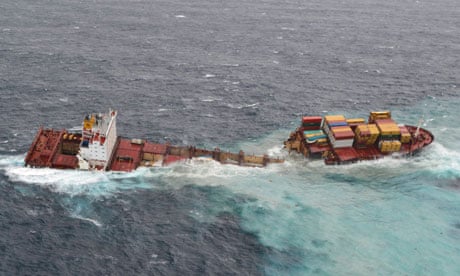A container ship grounded on a reef off the east coast of New Zealand's North Island succumbed to stormy weather and broke into two on Saturday night, releasing cargo into the water and prompting fears of a new oil spill.
Three months after the Rena sailed directly on to the Astrolabe reef, 12 miles from Tauranga harbour, in calm conditions, its stern section was torn from the bow when it was battered by swells of up to seven metres.
Officials from Maritime New Zealand said the rear part of the vessel was likely to sink, which could lead to a further slick. An oil salvage operation has drained more than 1,000 tonnes of heavy fuel from the ship's tanks, but more than 350 tonnes remain on board the vessel. The front remains precariously grafted to the reef. Forecasts suggest the worst of the weather has passed, but heavy seas are expected for the next three to four days.
About 350 tonnes of fuel-oil leaked into the sea after the Rena was grounded in October, in what was described as the country's worst maritime environmental disaster. As well as forcing local beach closures, the spill has killed many seabirds. The wildlife centre working as part of Maritime New Zealand's disaster response team for the Rena spill estimated that as many as 20,000 seabirds could have died. According to a report by the NZ Newswire news agency, the centre said more than 2,000 birds have been found dead; based on studies in the US and England showing that in such disasters only one in 10 dead birds are found, it projected a loss of up to 20,000.
"There is no way of knowing exactly how much oil was released from the duct keel when Rena's bow and stern separated, but some could still be trapped in the stern section," Maritime New Zealand said.
The New Zealand environment minister, Nick Smith, said the removal of oil from the Rena since the original spill had greatly lessened the potential impact of any new leakage. "The risk to the environment is a fragment of what it was, with at the most tens of tonnes of oil rather than hundreds of tonnes that potentially could be spilled," he said.
As many as 300 containers were thought to have fallen into the sea, the salvage operators said – more than three times the number lost overboard in the previous three months. Almost 600 containers remain on the ship.
Most of the lost containers were expected to sink, including as many as 20 containing cryolite from a South Island aluminium smelter.
Smith played down concerns about toxic materials in containers causing dangers, saying most were likely to dilute in the water.
Alex van Wijngaarden, the on-scene commander for the national response team, said staff were reporting to Tauranga to deal with any more oil released from the ship and to treat any affected wildlife. Tidal and weather patterns meant any oil lost in the initial hours had been directed offshore, but that could change.
"Current modelling suggests that beaches south-east of [the beach resort of] Mt Maunganui are most likely to be affected by oil and debris, which includes milk powder and timber," Van Wijngaarden said. "Anyone finding oil or debris is asked to report it immediately and to stay well clear, as all debris must be treated as if it is contaminated."
No beaches in the region had officially been closed to the public, he said, but local surf lifesavers were advising people to stay out of the water because of the debris and sea conditions.
An investigation into the grounding of the Rena, a Liberian-flagged ship owned by the Greek shipping firm Costamare, is ongoing. The ship's captain and navigation officer, both Philippine nationals, will next month face criminal charges relating to operating a vessel in a dangerous manner and allowing the release of toxic materials.
